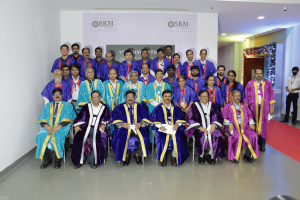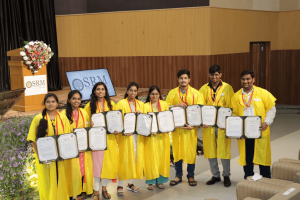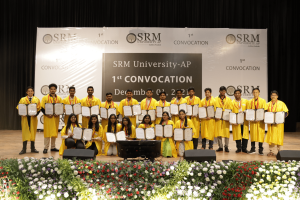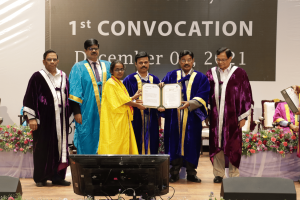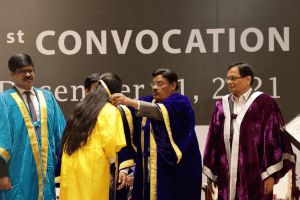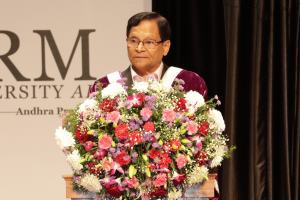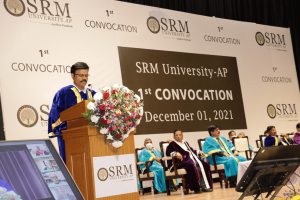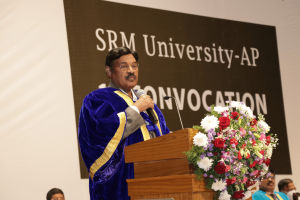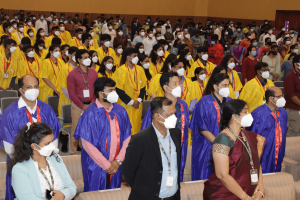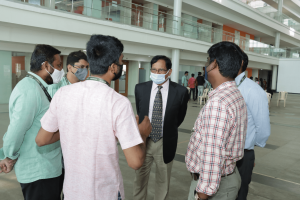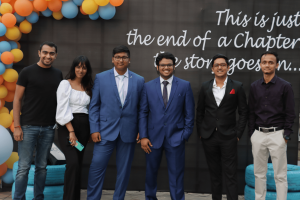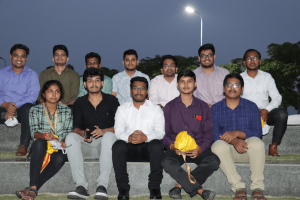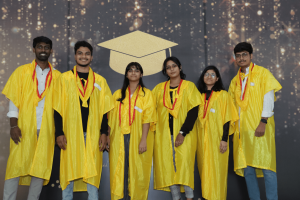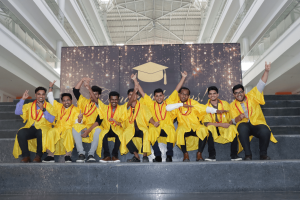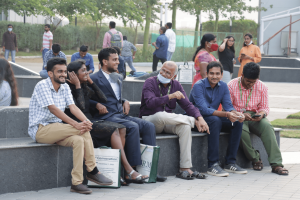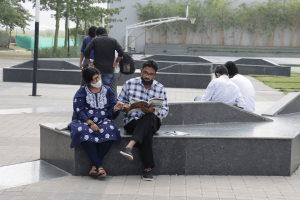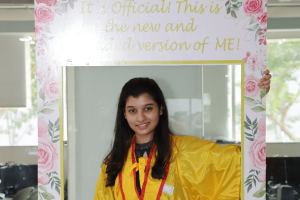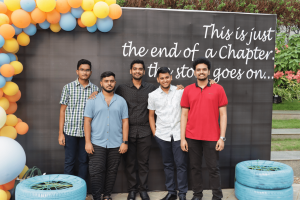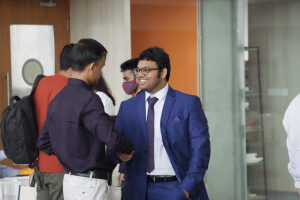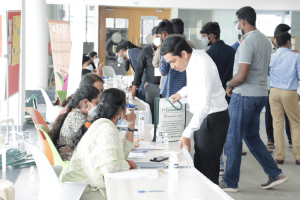SRM-AP All News
ALL News
- Best paper presentation award in the PRISM conference December 9, 2021
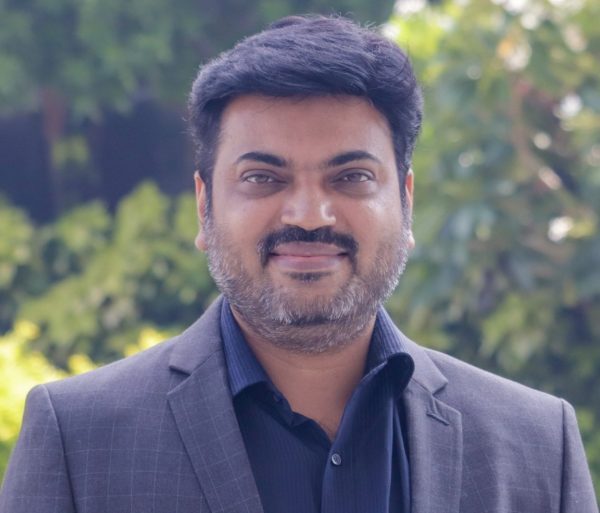 Research at SRM University-AP is always geared to top the solutions that we have to our current problems. One of the most enduring issues in the field of management is crisis management. The PRISM conference has found one of our faculty member’s solution to be most beneficial and awarded him with the Best Paper Presentation Award. Dr Vimal Babu, Associate Professor-SEAMS, has come up with a response that will not only help leaders manage crisis situations with increasing efficiency but also make it possible for them to thrive in the face of adversities.
Research at SRM University-AP is always geared to top the solutions that we have to our current problems. One of the most enduring issues in the field of management is crisis management. The PRISM conference has found one of our faculty member’s solution to be most beneficial and awarded him with the Best Paper Presentation Award. Dr Vimal Babu, Associate Professor-SEAMS, has come up with a response that will not only help leaders manage crisis situations with increasing efficiency but also make it possible for them to thrive in the face of adversities.About the paper:
The purpose of the present research is to understand how global pandemic forces shaped the leadership communication strategies of the managers working in the Information Technology (IT) industry in India, in turn, how their leadership communication strategies aided in achieving agile and authentic leadership communication in relation to their own employees. It studied the leadership communication strategies of managers which facilitated them to establish emotional connect with the employees working remotely during pandemic crisis.
Abstract:
An investigation of the major themes in leadership communication strategies during times of crisis is presented in this research. It applies thematic analysis (TA) as a qualitative method to investigate effective leadership communication strategies in crises to overcome employee-centric organisational issues. Major themes and sub-themes are linked together to grasp better understanding about qualitative data. As a result, a total of five major themes emerged. Findings reveal that HR managers must consider the impact on their employees’ well-being when making verbal communication and crafting messages for their teams during times of crisis. The research developed a conceptual framework for mapping out the major themes, viz. information consumption and news making; disinformation and narrative disruption; agile communication structures; striking the balance b/w humane and factual communication and leadership communication imperatives. The themes generated substantive theory featuring agile and authentic leadership communication for the managers. As organisational leaders, managers’ challenges and communication strategies during a crisis are discussed. Future research ideas are highlighted.
Social Implications:
As a result of this research, it is now possible to deal with crisis communication challenges of managers more effectively. To avoid reacting to disinformation, one must be able to recognise it when it appears in abundance in a short period of time and recognise it when it does not. Managers of the HR department are held in high regard by their employees, who look to them for guidance and support. An agile communication structure, such as clearly stated goals, lean approvals and clarity of purpose will have a big impact upon the designing of communication strategies initiated by organisational leaders, especially when the attempts are made to interact with the employees remotely. That being said, managers need to strike a balance between human and factual communication in order to develop trust, transparency, and cooperation with their employees.
Collaborators:
The present work has been successfully carried out with the contributions of the co-researchers of the research paper, viz. Dr. Anugamini Priya Srivastava, Symbiosis International University, Pune and Mr. Vipin Kumar, Project Management Professional, BT India.
Future:
The future research plans entail working in the area of employee sustainability, well-being and career development of the workforce along with crisis management.
Continue reading → - Dr Nimai Mishra on Impact of shell thickness on photostability studies of green-emitting “Giant” quantum dots December 8, 2021
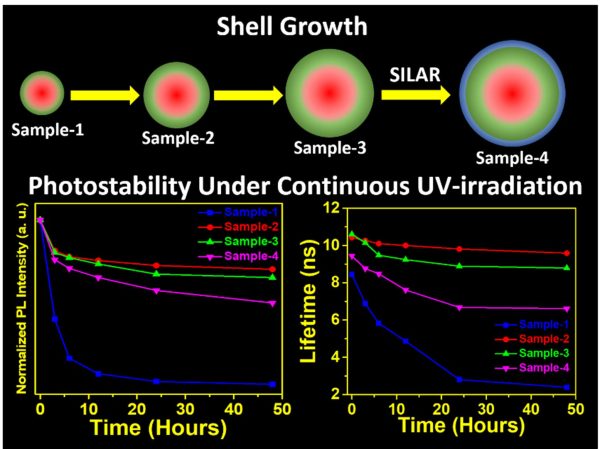 SRM University-AP is pleased to announce that Dr Nimai Mishra, Assistant Professor, Department of Chemistry, SRM University-AP, Andhra Pradesh, along with his research group comprising of students pursuing PhD under him, Mr Rahul Singh, Mr Syed Akhil, and Ms V.G.Vasavi Dutt, has published a research article titled “Shell thickness-dependent photostability studies of green-emitting “Giant” quantum dots” in the journal Nanoscale Advances (The Royal Society of Chemistry) with an impact factor of ~4.533.
SRM University-AP is pleased to announce that Dr Nimai Mishra, Assistant Professor, Department of Chemistry, SRM University-AP, Andhra Pradesh, along with his research group comprising of students pursuing PhD under him, Mr Rahul Singh, Mr Syed Akhil, and Ms V.G.Vasavi Dutt, has published a research article titled “Shell thickness-dependent photostability studies of green-emitting “Giant” quantum dots” in the journal Nanoscale Advances (The Royal Society of Chemistry) with an impact factor of ~4.533.About the research:
Highly efficient green-emitting core/shell giant quantum dots have been synthesized through a facile “one-pot” gradient alloy approach. Furthermore, an additional ZnS shell was grown using the “Successive Ionic Layer Adsorption and Reaction” (SILAR) method. Due to the faster reactivity of Cd and Se compared to an analogue of Zn and S precursors it is presumed that CdSe nuclei are initially formed as core and gradient alloy shells simultaneously encapsulate the core in an energy-gradient manner and eventually thick ZnS shells were formed. Using this gradient alloy approach, we have synthesized four different sized green-emitting giant core-shell quantum dots to study their shell thickness-dependent photostability under continuous UV irradiation, and temperature-dependent PL properties of nanocrystals. There was a minimum effect of the UV light exposure on the photostability after a certain thickness of the shell. The QDs diameter of ≥ 8.5 nm shows substantial improvement in photostability compared to QDs with a diameter ≤ 7.12 nm when continuously irradiated under the strong UV light (8 W/cm2, 365 nm) for 48 h. The effect of temperature on the photoluminescence intensities was studied with respect to shell thickness. There were no apparent changes in PL intensities observed for the QDs ≥ 8.5 nm, on the contrary, for example, QDs with < 8.5 nm in diameter (for ~7.12 nm) show a decrease in PL intensity at higher temperatures ̴90°C.
More importantly, these results highlight the synthesized green-emitting gradient alloy QDs with superior optical properties can be used for highly efficient green emitters and are potentially applicable for the fabrication of green LEDs.
Read the full paper: https://pubs.rsc.org/en/content/articlelanding/2021/NA/D1NA00663K
Continue reading → - 1000+ Placement Offers December 3, 2021
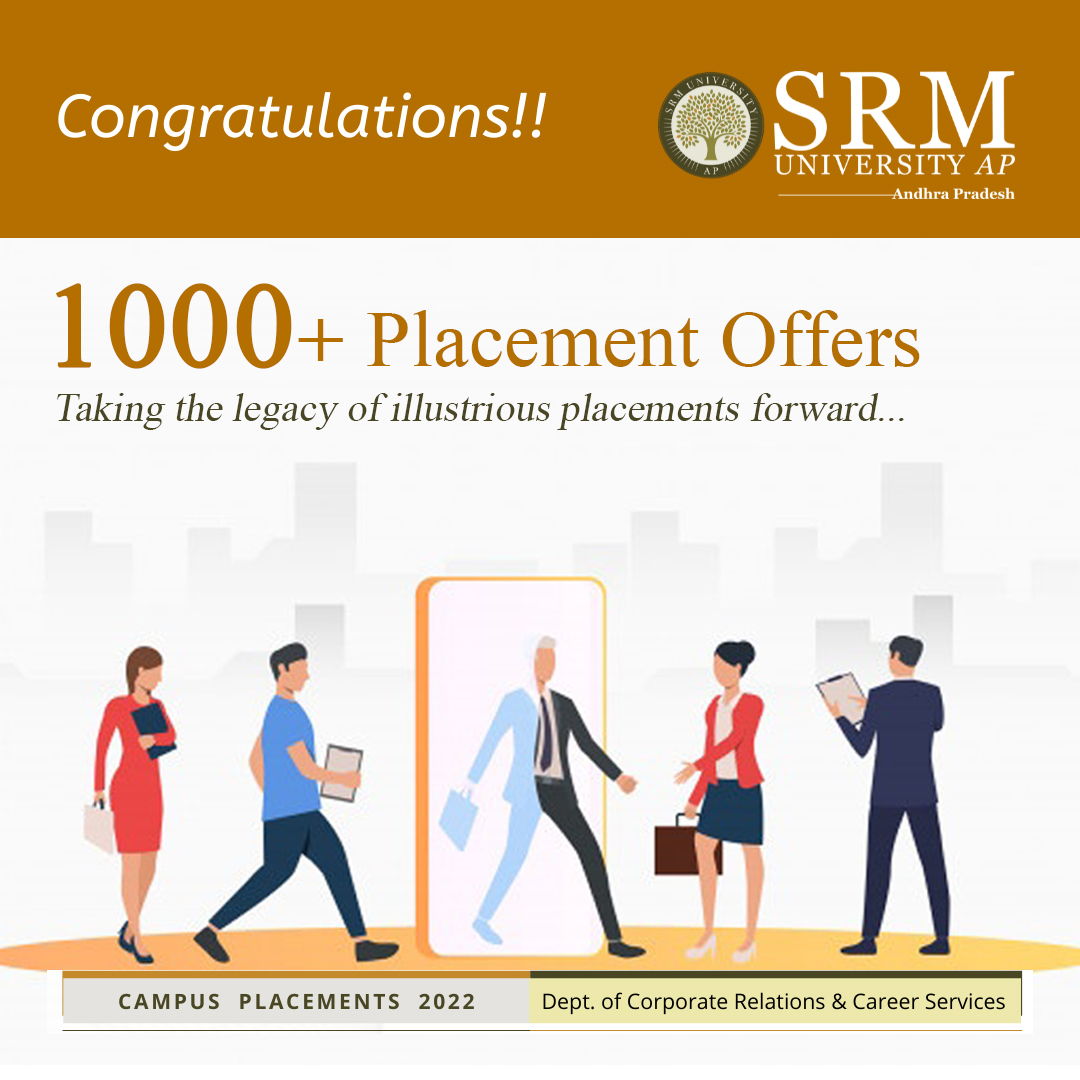 Our students have broken the highest salary for maiden batch placement offer records, our students have received best trainings and internships. And now, we can boast that we have crossed 1000+ placement offers. The Department of Corporate Relations and Career Services (CR&CS) is committed to taking the students to the next level of success. With more than 600 recruiting partners, the CR&CS team has ensured 100% placement for the students of SRM University-AP.
Our students have broken the highest salary for maiden batch placement offer records, our students have received best trainings and internships. And now, we can boast that we have crossed 1000+ placement offers. The Department of Corporate Relations and Career Services (CR&CS) is committed to taking the students to the next level of success. With more than 600 recruiting partners, the CR&CS team has ensured 100% placement for the students of SRM University-AP.The CR&CS team regularly organises placement training sessions and provides placement support. The students were provided with skill training, industry-readiness assistance, as well as interview tips online and offline which helped many of them secure placement offers from dream companies and super dream companies with lucrative salaries.
- 1st Convocation Ceremony for Class of 2021 December 2, 2021
On an auspicious December evening, SRM University-AP observed its 1st Convocation conferring degrees to 294 undergraduates. Dignitaries across the world joined together to embrace the special moment on December 01, 2021, at the SRM University-AP campus in a hybrid mode. Dr Andrew D Hamilton, President, New York University, graced the event as the Chief Guest. An Honorary Doctorate was awarded to the Guest of Honour Dr Sethuraman Panchanathan, Director, National Science Foundation, USA.
Dr Hamilton expressed his greatest admiration towards the new university and its first batch of students. Being associated with established heritage universities all his life, he expressed his utmost joy to be a part of a nascent university full of promises and potential to create a long and illustrious history. The achievements of the past three years are an active example of the limitless possibilities that SRM University-AP nurtures. Dr Hamilton expressed his opinion saying that this era is in critical need of higher education. Similar to the story of Robert Louis Stevenson, universities have the responsibility to ‘punch through darkness’, and SRM University-AP must be one of the vanguards. “It is extraordinary to see so many laurels to be brought by the students amid COVID-19 and a worldwide pandemic,” opined Dr Hamilton extending an open invitation to SRMAP fraternity to visit NYU and be a part of it.
In his speech, Dr Seturaman Panchanathan expressed his sincere gratitude upon receiving the honorary doctorate. In his advice to the graduating batch, he presented a mantra of 6 Cs to follow in life to be worthy of honour and respect. First, a great journey begins with ‘Curiosity’. To propel towards progress, you must foster curiosity and never cease asking questions. Second, you must always find the ‘Courage’ to stay positive. Trust your abilities and embrace your failures making those into stepping stones towards success. Third, true success can never be achieved alone. It is always a ‘Collaborative’ game. Fourth, effective ‘Communication’ is the key. Get people excited about what you are doing and accelerate the development with your expertise. Fifth, ‘Commitment’ is the essence of success. Be a life-long learner and dedicated to excellence. Lastly, ‘Compassion’ is the factor to bind all these together. Dr Panchanathan encouraged the graduands to learn these mantras by heart, and success will find them in life.
“SRM University-AP was established with a vision of catering for the educational needs of the students of Andhra Pradesh and India. Our motto from the beginning is to provide a holistic education for the overall personality development of the students. On the occasion of the 1st convocation ceremony, it gives me immense joy to share that our first batch of students has been able to imbibe the vision of the university into their lives. They were able to prove their mettle on every parameter, be it academic, extra-curricular activities or research,” opined Dr T R Paarivendhar, Chancellor, SRM University-AP.
President of SRM University, Dr P Sathyanarayanan, said that the education system in India is going through a transformation with the newly enacted National Education Policy-2020. SRM University-AP aims to be the vanguard of this transition. After the successful introduction of academics, SRMAP embarks on an even more ambitious challenge of extending its research wings to add value to society. “I am proud to confess that despite being a nascent university, SRM University-AP has created a niche for itself through its research projects funded by the Government of India and reputed industry giants,” asserted President Sathyanarayanan, congratulating faculty for their incessant support and guidance to the students. “Above all, I extend my love and appreciation to my dear graduands who are joined here to receive their degrees,” added Dr Sathyanarayanan.
Prof V S Rao, Vice-Chancellor of SRM University-AP, mentioned, “Today’s convocation ceremony is to acknowledge the merit to those who have been trained, examined and undoubtedly found worthy both in character and in learning.” He further implored the graduands not to be content with the initial academic instruction but always to aim high and dream big. “All of our dreams come true if we have the bravery to follow them, if we believe in ourselves and have the courage, commitment, passion, and competitive drive to sacrifice the minor things in life in order to pay the price for the things that are worthwhile,” advised Prof V S Rao. The event ended with the presentation of degrees and medals, followed by joyous celebrations
Continue reading → - Jairam Ramesh shared his wisdom “On the Journey of Writing” November 27, 2021
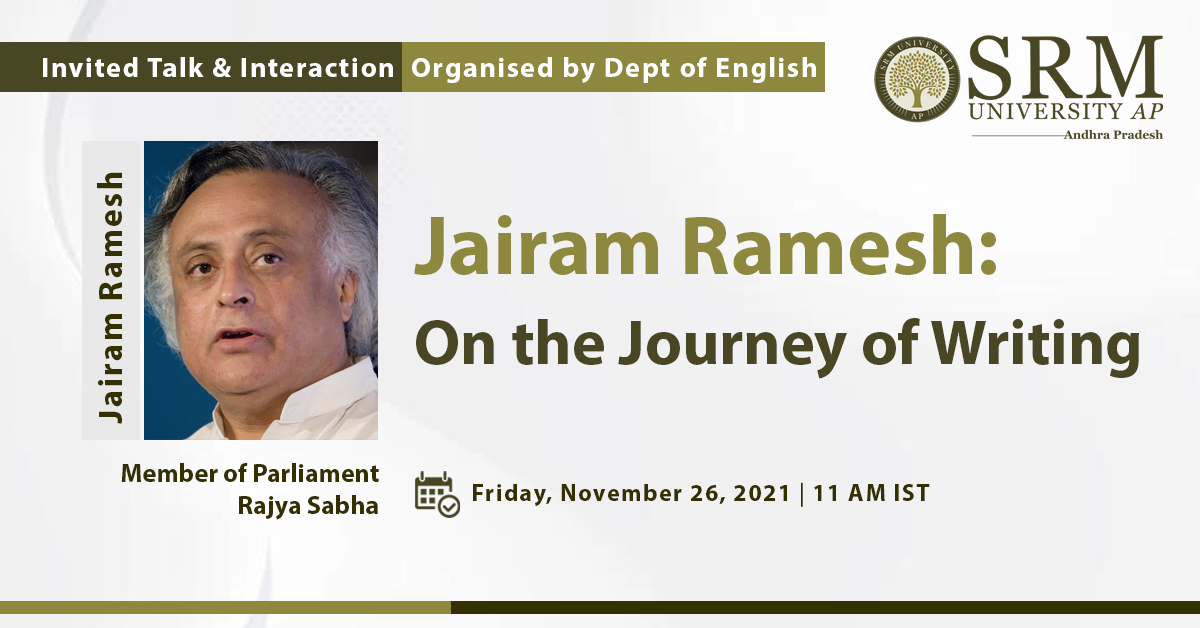 SRM University – AP, the multidisciplinary research-intensive university located at the heart of Amaravathi, initiated another unique programme titled “University Eminent Lecture Series for Liberal Arts and Social Sciences” today with Mr Jairam Ramesh – Member of Parliament, Rajya Sabha. Mr Ramesh participated in a vigorous interactive discussion “On the Journey of Writing”. Ramesh shared his process of and insights into writing and interacted with the members of the audience comprising faculty, students, scholars and attendees across the country. His generosity in terms of sharing tips for better writing, developing principles of writing, being well-disciplined about writing, and persisting and being patient with the process inspired others.
SRM University – AP, the multidisciplinary research-intensive university located at the heart of Amaravathi, initiated another unique programme titled “University Eminent Lecture Series for Liberal Arts and Social Sciences” today with Mr Jairam Ramesh – Member of Parliament, Rajya Sabha. Mr Ramesh participated in a vigorous interactive discussion “On the Journey of Writing”. Ramesh shared his process of and insights into writing and interacted with the members of the audience comprising faculty, students, scholars and attendees across the country. His generosity in terms of sharing tips for better writing, developing principles of writing, being well-disciplined about writing, and persisting and being patient with the process inspired others.Ramesh also spoke about his latest book The Light of Asia: The Poem That Defined The Buddha sharing that it was written during the lockdown period. His daily routine of sticking to a certain number of words or any other form of goal had made it easier for him to produce the work. This particular book is quite different in nature from its predecessors and reflects the same positive mindset that is an attribute of the author’s persona itself.
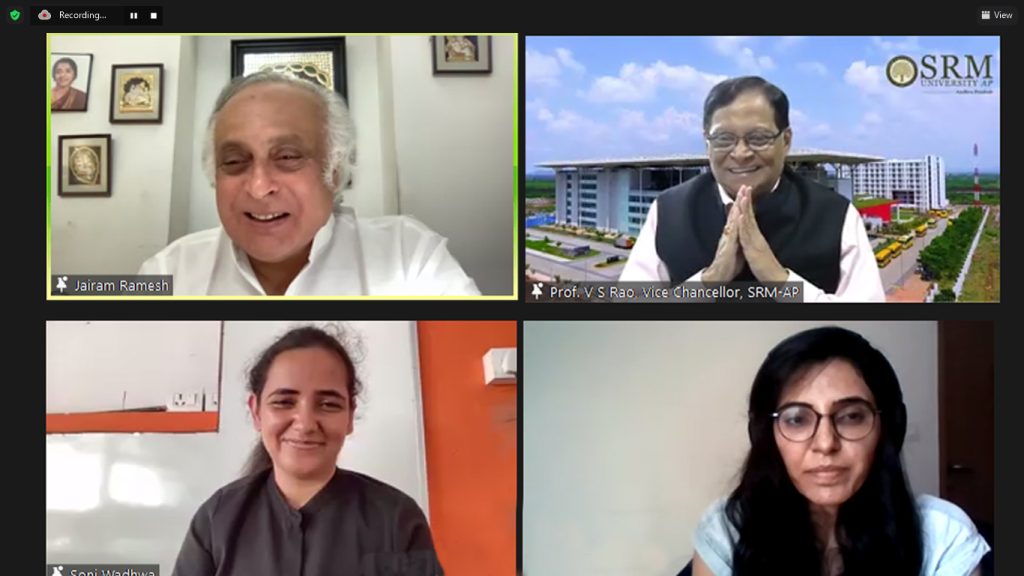 Regarding rejections of writing, he advised that failure should never be seen as something that deters a writer. He shared that his own journey began quite late and that his own writing goes through at least three drafts before it gets published. He emphasised that it happens because writing is an iterative process, in engineering terminology, and not a linear process, and that is what makes it a process full of surprises. He put a great emphasis on reading as well. To be a great writer, first, one needs to invest one’s time in order to be a good reader. He further shared his thought that this generation lacks the discipline of writing. It is never easy to communicate with readers until one is able to understand the mass psyche as writing is not only about expressing one’s point of view but also understanding the psychology of the targetted readers.
Regarding rejections of writing, he advised that failure should never be seen as something that deters a writer. He shared that his own journey began quite late and that his own writing goes through at least three drafts before it gets published. He emphasised that it happens because writing is an iterative process, in engineering terminology, and not a linear process, and that is what makes it a process full of surprises. He put a great emphasis on reading as well. To be a great writer, first, one needs to invest one’s time in order to be a good reader. He further shared his thought that this generation lacks the discipline of writing. It is never easy to communicate with readers until one is able to understand the mass psyche as writing is not only about expressing one’s point of view but also understanding the psychology of the targetted readers.The universities need to establish a system whereby they can encourage students to read a body of work from disciplines other than their own and produce a paper at the end of their reading, Ramesh argued. The engineering students need to know what is happening in economics or literature, for instance. Similarly, students studying literature should know what is happening in sciences. This cross-fertilisation would help students get exposed to thinking in general.
The audience asked him several questions about the sources that can be consulted for getting better at writing, ways of integrating feedback into writing, means to writing with objectivity, balancing conscious effort with spontaneity and so on. His ideas inspired students and faculty alike.
Prof V S Rao, Vice-Chancellor of the University, who was there to welcome Ramesh kept interacting with him throughout the programme. He extended an invitation to Ramesh to visit the university early next year to motivate the students in person. The event ended with a vote of thanks by Faculty Coordinator Dr Supriya Daniel.
Continue reading → - Top 5% most cited author: Royal Society of Chemistry November 23, 2021
 SRM University-AP could not be more proud to announce that Dr S Mannathan, Head of Department of Chemistry has made it to the top 5% in the list of the Most Cited Authors by the Royal Society of Chemistry. It is inspiring to have a faculty member in our midst whose work has helped and facilitated the research of so many others.
SRM University-AP could not be more proud to announce that Dr S Mannathan, Head of Department of Chemistry has made it to the top 5% in the list of the Most Cited Authors by the Royal Society of Chemistry. It is inspiring to have a faculty member in our midst whose work has helped and facilitated the research of so many others.Dr Mannathan obtained his doctorate from National Tsing Hua University, Taiwan. His research interests primarily lie in Metal-catalyzed organic transformation reactions, Multicomponent reactions, and Asymmetric synthesis. His research followed by scientists all over the world leading him to become one of the top 5% authors in terms of citations
In the field of Transition Metal Complexes as Catalysts in Organic Reactions, he particularly leans towards ‘Nickel-and cobalt-catalyzed three-component coupling and reductive coupling reactions’, and ‘Palladium-catalyzed reductive arylation’. Similarly, in Asymmetric Synthesis, he favours research into ‘Asymmetric reductive Heck reaction for the synthesis of chiral indanones’, and ‘Synthesis of bicyclic tertiary alcohols and its related asymmetric version via reductive [3+2] cycloaddition reaction by using chiral cobalt complexes.’
About the top 5% most cited paper:
In this work, he reported the synthesis and application of a Zn-Bp-BTC MOF (Bp – 4,4′-bipyridine; BTC – 1,3,5-benzene tricarboxylic acid; MOF – metal organic framework) as a heterogeneous catalyst for mediating organic reactions. Initial reaction conditions were optimized for the Knoevenagel condensation reaction using Zn-Bp-BTC as a heterogeneous catalyst. Various factors such as the effect of solvent, temperature and catalyst loading were evaluated. Although the reaction proceeded at room temperature using methanol as the solvent, 60 °C offered the best yield in a shorter duration. Under optimized reaction conditions, a wide range of α,β-unsaturated dicyano compounds were prepared from the corresponding carbonyl precursor and malononitrile, the active methylene counterpart. A systematic investigation was also carried out to assess the role of the ligand and metal salt in the Knoevenagel condensation reaction. It was found that the Zn-Bp-BTC MOF catalyzed the reaction efficiently in comparison to its analogue Zn-BTC MOF and precursor Zn(NO 3 ) 2 ·6H 2 O. Finally, catalytic recycling and stability studies showed that the catalyst is able to mediate the reaction for up to five consecutive cycles without undergoing any significant chemical or morphological changes. Further, the catalyst was tested for its efficacy in a multicomponent reaction (MCR). An MCR with the Zn-Bp-BTC MOF as the catalyst afforded good yields and there was no reaction in the absence of the catalyst. Similarly, the catalyst was tested for its efficiency in benzimidazole synthesis.
Dr Mannathan did this research in collaboration with Dr. Kathiresan Murugavel, Scientist, Electro Organic Division, CSIR-Central Electrochemical Research Institute (Govt of India), Karaikudi.
Continue reading → - Detection of diabetic retinopathy (DR) severity from fundus photographs November 19, 2021
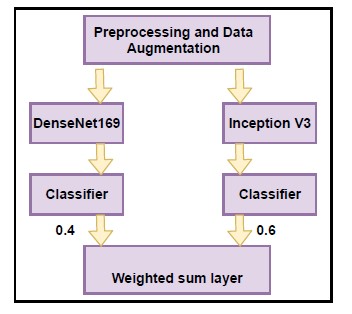 A research paper titled “Detection of Diabetic Retinopathy (DR) severity from fundus photographs: An Ensemble Approach using weighted average”, has been published by Dr Mahesh Kumar Morampudi, Assistant Professor of Computer Science and Engineering, in the Arabian Journal for Science and Engineering.
A research paper titled “Detection of Diabetic Retinopathy (DR) severity from fundus photographs: An Ensemble Approach using weighted average”, has been published by Dr Mahesh Kumar Morampudi, Assistant Professor of Computer Science and Engineering, in the Arabian Journal for Science and Engineering.Diabetic Retinopathy is a common diabetic disease that affects the retina and can result in blindness if not treated initially. Deep learning (DL) based models are proposed to detect the blood abnormalities in the retinal tissue due to diabetes mellitus obtained from fundus camera. The drawback of these models is the lack of performance. To address this, we propose to automate the process of detection of the severity of Diabetic Retinopathy (DR) using ensembles of pre-trained models, thus exploring the power of transfer learning in the field of automated diagnosis. Deep learning models perform well when the model is trained on a large amount of data. In this regard, we also put forth data augmentation and preprocessing techniques to generate synthetic images and to improve image quality. Extensive experimental results on publicly available databases illustrate that the proposed ensemble model achieves fair accuracy when compared to existing models. Thus, the proposed model shows good scope for deployment in real-time diagnosis.
Every year multiple people are diagnosed with diabetes. Diabetes is a chronic disease that affects several organs of the human body namely the eyes, kidneys, heart etc. Diabetic Retinopathy (DR) is a situation induced by diabetes in which severe loss happens to the retinal blood vessels that can ultimately lead to blindness. Regular diabetic retinopathy screening is hence needed for detecting it in advance. In the present situation, a trained clinician or an ophthalmologist is required to identify diabetic retinopathy (DR) by the existence of lesions related to the vascular abnormalities induced by the disease. The ophthalmologist needs to evaluate and examine digital colour fundus images of the retina. So, it is a very tedious and sluggish process. He/She needs more time to diagnose DR. The diagnosis of the disease by any manual means seems to be tiresome and usually results in errors. To overcome this limitation, we propose a model to automate the process of detection of the severity of DR using ensembles of pre-trained models, thus exploring the power of transfer learning in the field of automated diagnosis.
The research group believes that the study helps ophthalmologists to identify diabetic retinopathy at its early stage accurately, as a result, the chance of losing the vision due to diabetic retinopathy can be reduced. The work is done in collaboration with Dr Mulagala Sandhya, Assistant professor, NIT-Warangal. In the future, Dr Mahesh Kumar plans to work on a project related to Privacy-preserving Biometric Authentication.
Continue reading → - Coveted Marquee offers up to ₹42.5 LPA chase our students November 19, 2021
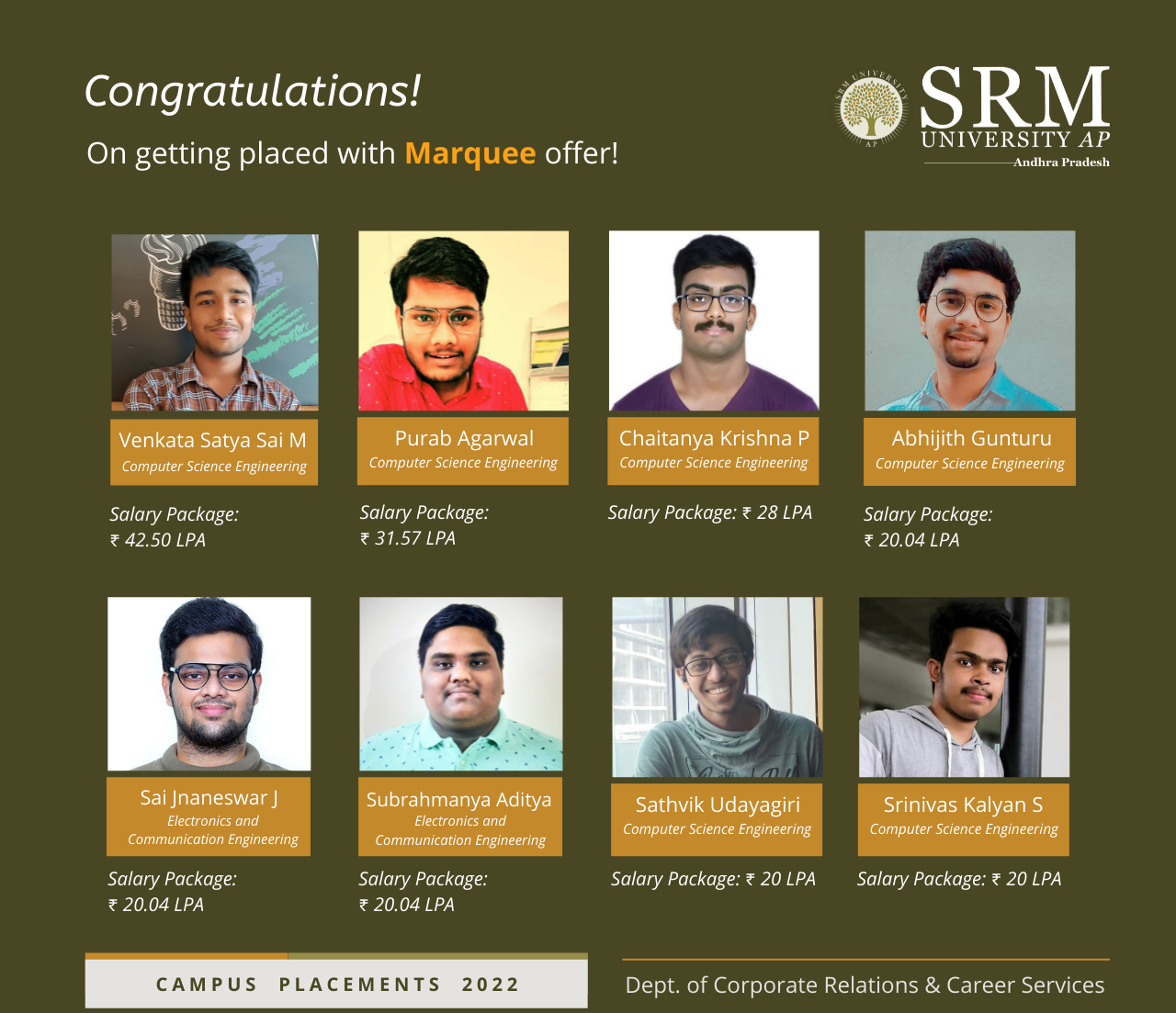 Purab Agarwal, Chaitanya Krishna Pasula, Srinivas Kalyan, Udayagiri Sathvik, Myneni Venkata Satyasai, Gunturu Abhijith from the Department of Computer Science and Engineering, and Vellampalli Medha V Subramahnya Aditya and Sai Jnaneswar Juvvisetty from the Department of Electronics and Communication Engineering are excited about their placement with Marquee offers up to ₹42.5 LPA. These students from the most sought Engineering branches of SRM University-AP burned the midnight oil and have achieved the best!
Purab Agarwal, Chaitanya Krishna Pasula, Srinivas Kalyan, Udayagiri Sathvik, Myneni Venkata Satyasai, Gunturu Abhijith from the Department of Computer Science and Engineering, and Vellampalli Medha V Subramahnya Aditya and Sai Jnaneswar Juvvisetty from the Department of Electronics and Communication Engineering are excited about their placement with Marquee offers up to ₹42.5 LPA. These students from the most sought Engineering branches of SRM University-AP burned the midnight oil and have achieved the best!Our placement team has thoroughly trained the students both in terms of technical expertise and soft skills, as the recruiters shortlist the best young talent who are passionate, devoted to learning, and bubbling with fresh and creative ideas. The talent and motivation of students, together with the intensive instruction they have received since the beginning of their BTech programme, have enabled them to excel in the recruitment drive. The CR&CS department feels that this is just the start of the placement season and that many more outstanding students are eager to demonstrate their abilities to obtain fantastic job offers from top-tier employers.
“I have gained a lot of knowledge from faculty members. All the questions asked in the interview were related to the curriculum of SRM AP”, says Udayagiri in enthusiasm. “The support extended by the placement department as training before the placement and during the placement was also very helpful to crack this interview. The sources or materials that were provided to me before the interview were very helpful to me to crack the interview”, he added.
Know more about our placement legacy at: https://srmap.edu.in/about/crcs/
Continue reading → - BA History to MS Computer Science: The interdisciplinary journey abroad November 17, 2021
 ‘Fostering curiosity and nurturing inquisitiveness’ These have been the goals of the Department of History at SRM University-AP to which Deva Harshalai Nimmagadda, Class of 2021 of Bachelor of Arts in History, belongs.
‘Fostering curiosity and nurturing inquisitiveness’ These have been the goals of the Department of History at SRM University-AP to which Deva Harshalai Nimmagadda, Class of 2021 of Bachelor of Arts in History, belongs.The entire department and especially his beloved mentor, Dr Maanvender Singh, could not be more proud of him for securing a coveted position in the MS Program in Computer Science at Pace University, New York. Deva found a home for his desire to understand the past and progress towards future in SRM University-AP’s multidisciplinary courses which enabled him to learn more about cutting edge technology and innovative approach to history. This experience was instrumental in helping him achieve his place.
“During my course of studying BA History in SRM University-AP, I have realized that history will not equip you with the skills in only one field, but it also opens you up to diverse fields.” Deva said, “Thanks to the curriculum in SRM University-AP which enabled me to explore various fields like economics, Journalism, Data Science etc. Studying history will demand immense research work and it will refine your analytical skills and these are the skills you need to live in a Tech world. I would like to thank all my faculty for equipping me with such skills even during the pandemic. Today interestingly History major in my profile attracts various employers and projects as they believe in the analytical skill of a history major.”
Prof Singh, who is very fond of Deva Harshalai, spoke very highly about his student, “Deva always cultivated the best attributes a historian could possibly possess- the endless and untiring urge to quest for reason and answers, and the unique and insightful perspective to provide the most logical and comprehensive solution.” He added, “With these qualities in one’s possession one can achieve any ambition should they put their mind and efforts to it.”
“The right skill was cultivated in me, and the right attitude took root.” Deva said to inspire his juniors, “I am extremely grateful to have had the opportunity to call SRM University-AP my alma mater. I am who I am today because of it. I would advise all my juniors to commit to their education seriously and SRM University-AP will give you the experience and encouragement to obtain your dream career.” Deva would like to take advantage of this world capital and invest himself in research and development in the fields of Artificial Intelligence in future.
Continue reading → - Team Sunshine celebrate Children’s day in magnificence November 16, 2021
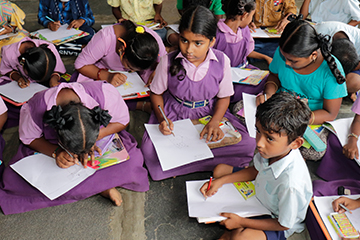 Children’s Day celebrations were held at Nirukonda and Nauluru government schools from Friday to Monday under the auspices of the Student Affairs department at SRM University-AP. The programme named SRM Sunshine, organised various games and competitions for students from classes one to ten and distributed prizes to winners. The essay writing, drawing, running, skipping and musical chair competitions focused on children and their enjoyment contributing to their cognitive development.
Children’s Day celebrations were held at Nirukonda and Nauluru government schools from Friday to Monday under the auspices of the Student Affairs department at SRM University-AP. The programme named SRM Sunshine, organised various games and competitions for students from classes one to ten and distributed prizes to winners. The essay writing, drawing, running, skipping and musical chair competitions focused on children and their enjoyment contributing to their cognitive development.Students of SRM University-AP mingled with the children involving them in various games. The tiny tots of Preschool and Pre-primary celebrated the day with much joy and enthusiasm. The celebrations began on Friday, followed by a variety of fun-filled activities and games planned by the Sunshine team. Children were given chocolates and gifts like crayons, pencils etc. as a token of appreciation. The event was attended by Ms Revathi Balakrishnan, Assistant Director – Student Affairs; Dr Abdul Mohimin, Assistant Director – Physical Education and Mr Narendra Babu, Manager – Student Affairs.
Every year on November 14 India celebrates Children’s Day, the birth anniversary of Pandit Jawaharlal Nehru, India’s first Prime Minister. The day is also known as Bal Diwas. He adored children and once said that children are the country’s future and that they should be loved. Children also adored him and referred to him as ‘Chacha Nehru.’
Continue reading →


